On Monday evening, July 27, Mike Wilson presented another of his “In the Room” events at his Toronto Maple Leaf museum in his home in Toronto. The featured guest on this evening was Bill White, former NHL defenseman who also played a key role in Team Canada’s victory over the USSR in the 1972 Summit Series. Soft-spoken but eloquent, Bill related tales of his career, his experience in that 1972 series and other anecdotes. Among the guests who posed questions and made comments were journalists Lance Hornby and John Iaboni, hockey historians Paul Patskou and Jim Amodeo, and former Detroit Red Wings general manager Jimmy Devellano.
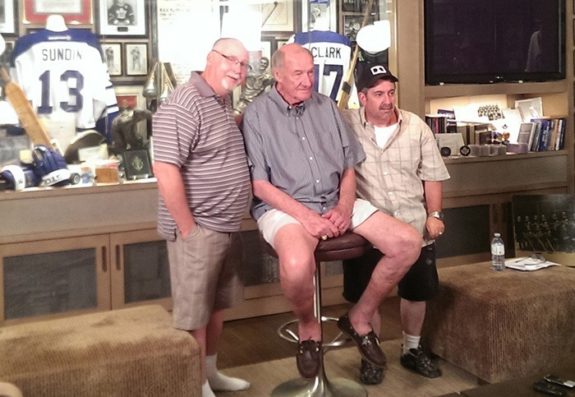
Bill White’s Career was Better Than Most
Bill White’s professional hockey career spanned from the 1960-61 season through to 1975-76. His playing days were cut short by a neck injury that forced his retirement. Shortly after it became official that he would no longer be able to play, he was named coach of the Chicago Blackhawks, replacing long-time Chicago bench boss Billy Reay.
Mr. White was born in Toronto on August 26, 1939 and played all of his minor and junior hockey in that city. He became Toronto Maple Leaf property in his teens and eventually graduated to the Junior A ranks, playing for the Marlboros, Toronto’s top Junior club. He spent three years with the Marlies as a solid, stay-at-home defender, unspectacular in junior, but very efficient.
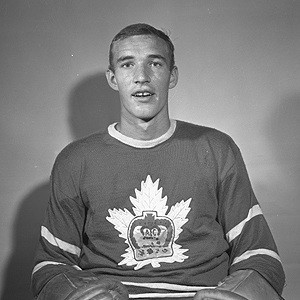
Bill moved into the professional ranks in 1960-61, starting out with the Sudbury Wolves of the Eastern Professional Hockey League. Early in the season, he moved up to Rochester of the American Hockey League, the Leafs’ main minor pro farm team. After a season and a half with Rochester, Toronto traded Mr. White to the Springfield Indians of the AHLin a four for one deal that saw Kent Douglas move to the Leafs.
Bill toiled in Springfield under the legendary Eddie Shore for five seasons, until the great NHL expansion of 1967. The Springfield club was purchased by Jack Kent Cooke, owner of the new Los Angeles Kings, and all of those players under contract to the Indians became property of the Los Angeles NHL team. This proved to be Bill’s big break.
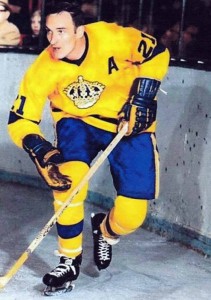
White was easily the best Los Angeles defenseman in that first season. He led the Kings’ defensemen in scoring in that first year, with 11 goals and 27 assists, high numbers indeed for the league at that time. Most experts had picked Los Angeles to be by far the worst team in the new Western Division of the NHL, but the Kings surprised and finished in second place, one point back of the Philadelphia Flyers. The contribution made by the former Springfield Indians, especially by White, was instrumental in the Kings’ early success.
Midway through the 1969-70 season, the Kings had fallen on hard times and were headed to a disastrous last-place finish. General Manager Larry Regan decided to make major changes to the team, and one of his moves included a six-player trade with the Chicago Blackhawks. Regan sent White, goalie Gerry Desjardins and centre Bryan Campbell to the Hawks for goalie Denis DeJordy, defenseman Gilles Marotte and forward Jim Stanfield. After being stuck on the NHL’s worst team, Bill suddenly found himself on one of the NHL’s best.
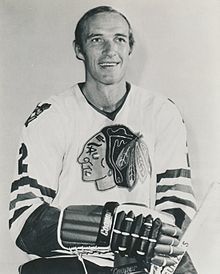
White teamed with Pat Stapleton and found instant chemistry. The pair became one of the best defensive duos in hockey for six seasons. They were both selected to play for Team Canada 1972 against the Soviet Union. White and Stapleton were the two defensemen coach Harry Sinden entrusted to protect that precarious one-goal lead for the final minute of play in game eight.
Playing for Eddie Shore
Bill spoke of his early playing days, which featured five years playing for Eddie Shore. He related the story of the 1964-65 season and how the Springfield players went on strike over Shore’s unreasonable treatment. Bill described the situation this way:
“Eddie was starting to get a little out of hand suspending players and going crazy. Myself and Dale Rolfe and Dave Amadio, went on strike. We just told Eddie ‘we’re just not playing right at this time.’ So he tried to get some players to come in and play in our places. So, we got Brian Kilrea, and there was a young lawyer at that time named Alan Eagleson in Toronto. He came down with one of his partners, Bob Watson and they gave Eddie the ultimatum – either lighten up or you lose your franchise. Eddie reluctantly gave in and eventually the team was sold. This was really the true start of the players association.”
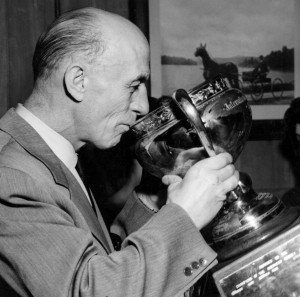
But Mr. White wasn’t going to completely vilify Shore, one of the NHL’s all-time greatest defensemen.
“I gotta admit, Eddie, he had some good points and some bad ones. You just had to weed out the ones you thought were crazy for defensemen to be doing. If you stood up to Eddie, he respected you.
“He had some really beneficial drills, especially for defensemen. I was tall and he brought my centre of balance down to where I was more manoeuvrable. left and right. Whatever I did on my natural side, he made us do on the other side, so we became very manoeuvrable each way.”
Mr. White also described a few of Shore’s eccentric ideas, one being that he gave Bill advice on how to have a male child. He did have a son after three girls.
Paul Patskou asked Mr. White how it felt to be buried in the American League when lesser players were in the NHL. Bill said that he often saw general managers like Tommy Ivan of Chicago and Sid Abel of Detroit around the team, trying to make a deal for him or another of the Indians. The problem was, that Shore always asked too much for his players and the NHL teams refused to meet his demands.
Jim Devellano also remarked how certain players were simply buried in the AHL. He mentioned players like Art Stratton, Willie Marshall, Frank Mathers and Fred Glover, all AHL legends who never seemed to get a solid shot in the big league.
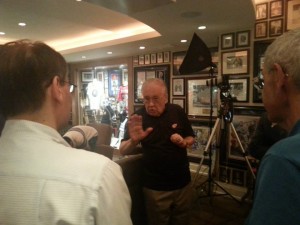
“If you got off on the wrong foot with an NHL team, if you said the wrong thing, they just buried you. But expansion opened up a whole new ball game.”
Playing for the Kings
Mr.White described how Jack Kent Cooke bought the team and took all the players to the first Los Angeles Kings training camp.
“He took us all to camp. Some made it and some didn’t – some of us stayed in the NHL, the rest were assigned back to Springfield.”
Bill also talked about his dealings with Larry Regan, the general manager of the Kings that led up to his trade to Chicago in 1969-70. Contract negotiations were very different in those days. He had no agent, and contract talks were held directly between the player and the GM. Bill said that Larry had “said some things that Mr. Cooke didn’t know about.” Bill had been promised a renegotiation of his contract by Regan and finally at training camp he demanded that Regan take him to meet Cooke. When they finally got together in Cooke’s hotel room, the owner told Bill that there were NO contract re-negotiations.
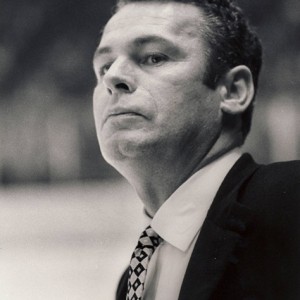
Bill left training camp (although he would later return to the ice after being promised he would be traded). It took until late February, but he was finally dealt to Chicago, which Bill felt was the best thing that could have happened.
Mr. White talked about playing for the expansion Kings, and the environment in Los Angeles. He said that, being from Toronto, he enjoys the four seasons, and had a great deal of difficulty adjusting to the endless summer of California.
“One day while I was in the whirlpool getting treatment for a knee injury a reporter asked me how I liked L.A. I told him I found the hot weather and playing hockey very strange, the two of them going together. Mr. Cooke took that to mean I didn’t like L.A. I said to Mr. Cooke ‘Being from the Beaches area of Toronto, you must like the four seasons too.’ It didn’t matter, I was still going, and I went to Chicago.”
Bill says that playing in Los Angeles was a different feeling than other hockey towns. The city is very spread out, and of course, there was no recognition when out in public, which wasn’t necessarily a bad thing.
Bill really enjoyed his time in Chicago, even when he was an opponent with the Kings.
“I loved the city, I loved the stadium, I loved the crowd. I liked the size of the rink, in my mind it was perfectly built for a defenseman. Things went well there. When I was traded there we were in last place, and we went from last to first.”
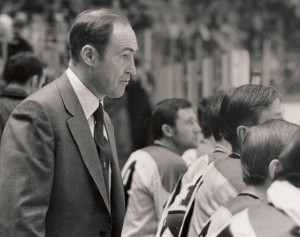
Mr. White liked playing for coach Red Kelly.
“He was great – he didn’t swear. Red was good. I remember training camp in Barrie. Cook came out, with all that flamboyance, he had an ego so big, telling us we could all be millionaires, blah, blah. So we were all very impressed. The year went on and of course Red wasn’t so impressed. Red had a dart board with Cooke’s picture home in the kitchen.”
Bill White – Team Canada 1972
Bill talked about how he found out he would be with Team Canada for the 1972 Summit Series.
“It was in the summer and I was at the cottage when I was asked if I would like to be part of it. To this day, I thought I was just going down to the Gardens to try out. I didn’t know I was actually going to play on the team.
“The first player I met in the parking lot was Frank Mahovlich. We walked in and there were all these players who had just finished playing against each other, about four or five guys from each team. A lot of us weren’t the best of friends! It was a whole different feeling in that dressing room playing with guys who were your enemies at one time.
It took some time, but you could see it start to blend in a little better. It was a tough training camp – probably not by today’s standards, but it was tough. From there they did a few cuts and the team was formed.”
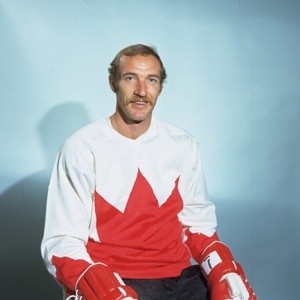
The Team Came Together in Sweden
Bill said that the team really came together when they went to Sweden for the exhibition games before the final four games in the USSR. He said that after the games in Canada the players were starting to get to know each other and get into shape.
Jim Devellano commented that the advantage the Russians had was that they worked out all year, unlike the North American professionals, and they were in better condition to start the series.
Mr. White commented on the Russian preparation:
“They were ready, and the Russians, they really don’t go anywhere unless they are prepared. We knew they were good hockey players from the last several Olympics and World Championships so we didn’t take them lightly at all.”
Mr. White said that he understood that the series was formed to improve the relationship between the two countries. He said that in the beginning, a certain amount of players were to be chosen for each side, and each player was to play at least one game. That was the reason he and partner Pat Stapleton sat out the first game.
Mr. White said that first game started well, but in the dressing room at the end of the first period Team Canada’s players were starting to fade due to lack of conditioning. Of course, the roof fell in and as Mr. White put it, “A lot of pride was at stake now, and it didn’t turn into a friendly situation after that. It became a very political war between two systems. And it really wasn’t pretty.”
Mr. White said that the team left Vancouver on a very down note, after being booed off the ice. He said that the impassioned speech by Phil Esposito after game four cemented his status as the team’s unofficial captain and leader. He said that the exhibition games in Sweden got the rteam ready as they headed into Moscow for the final four games.
Russian Dirty Tricks
Mr. White also described some of the dirty tricks the Russians played on the Canadian team to throw them off in the USSR. They received telephone calls in the middle of the night, with no one on the phone when it was picked up. All of the Canadians’ food was stolen. The team also had, as Bill described it, “a nice stock of beer” and that disappeared as well. It was on the plane when the team arrived, but went missing almost immediately. More food had to be shipped in from Norway.
The players were made to wait for hours before being able to leave the plane, and had to answer many questions about how much money and jewelry they were bringing into the country. Once they were off the plane, they were forced to wait hours for their luggage. This was all done intentionally to inconvenience the Canadians in any way possible.
Mr. White said that Frank Mahovlich was one of the Canadians most affected by the Russian tactics. Mahovlich was from Croatia and feared that the Russians, who seemed to know all about Frank’s family in Toronto, would take some sort of action against him or the family.
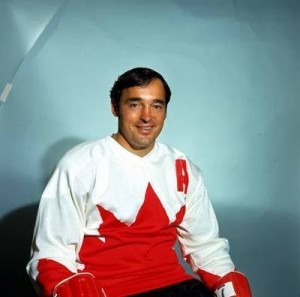
About being trusted by coach Harry Sinden to play the final half-minute of game eight to protect the lead, Mr. White laughed.
“We looked over to the bench and no one was getting up – they all had their heads down! So we stayed out there.”
Asked about the story about Pat Stapleton retrieving the puck at the end of the game, Mr. White said, with a laugh, that Mr. Stapleton would have to answer that question.
Mr. White talked about the play on which Bobby Clarke broke the ankle of Russian star Valeri Kharlamov. He said that assistant coach John Ferguson had said to Clarke that something had to be done about Kharlamov, and that Bobby took it upon himself to do it, and he broke his ankle with a slash.
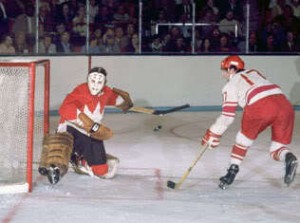
Former Toronto Sun sports reporter John Iaboni asked Mr. White about the fact that Russian goalie Vladislav Tretiak was in the Hockey Hall of Fame, while Canadian hero Paul Henderson is not. His reply:
“Well, I don’t believe Tretiak should be there. It’s just my opinion. But Paul is a national hero. I don’t see any reason why he shouldn’t be in that Hall of Fame. I remember him playing with Detroit and Toronto, he had good stats, and he had winning goals that should be recognized.”
Coaching the Hawks
Jimmy Devellano asked Mr. White about taking over as coach of the Blackhawks when Billy Reay was fired.
“I had Orr and Mikita as assistants – not bad, eh?”
Mr. White went on to say that Stan Mikita didn’t really want to be involved in coaching, he just wanted to play his game. Bobby Orr was going through a really bad time with his knee and a lot of frustration was setting in for him. He would ask the both of them for advice all the time. However, in the end, Stan concentrated on his play while Bobby removed himself from the team over the frustration with the knee and went home.
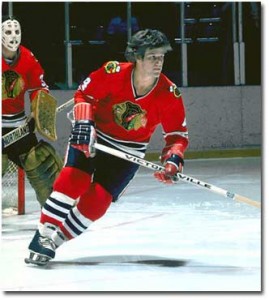
“Bobby played 13 games with the Hawks and I could tell he was having trouble with his knee. Guys were starting to get a step on him. Through his frustration he was getting in involved with team mates, arguments, stuff like that. That night I got a knock on the door, it was Bobby. He said he had enough, he was retiring. That was it, such a shame at such a young age.
“I didn’t like coaching, it’s not my thing. They make it look so easy. They were guys I had just finished playing with. The guys used to come in my office and put their feet up on my desk!
I remember in L.A. one time, Johnny Marks and Dale Tallon came in after curfew. I said ‘Okay guys, I gotta fine you. Do you want me to send you home or do you want the fine? They would rather take the fine!”
Playing With Stapleton and Others
Mr. White really didn’t know why he and Pat Stapleton worked so well together as a defensive pair, saying they never practised anything. Everything just worked so well between them.
Mr. White also spoke of the WHA. He was selected by the Miami Screaming Eagles in the inaugural WHA draft. He never really considered the rival league, although his partner Stapleton did move to the Chicago Cougars.
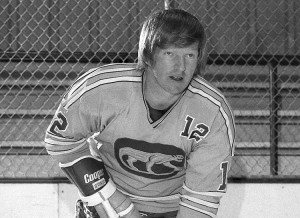
Mr. White said the three most significant events in his career was the NHL expansion, his trade to Chicago and being named to play for Team Canada in 1972. He also said that the best player of all time was Bobby Orr. When asked to describe the three best players he played against during his career, Bill named Orr, Gordie Howe and Jean Beliveau.
Jim Devellano mentioned that the three best goaltenders he saw were Terry Sawchuk, Jacques Plante and Glenn Hall, a fact with which Mr. White readily agreed.
Mr. White also discussed various other team mates including Stan Mikita, Pit Martin, Jim Pappin and others. He said he was extremely proud to have been able to play with and against the best hockey players in the world.
Bill also talked about his reputation as an accomplished prankster. He listed his best pranks as stealing referee Bill Friday’s skates and Chicago reporter Bob Verdi’s typewriter. His favourite, though, was the night he named the late Keith Magnuson captain of the Blackhawks shortly after becoming coach.
Mr. White invited Keith and his wife to dinner at a very posh Chicago steak house. At the dinner, Bill told Keith he wanted him to be the next captain of the Hawks, an honour Keith readily accepted. Bill and the Magnusons celebrated most of the night. After the meal, Bill excused himself from the table, and left the restaurant – sticking Magnuson with the cheque.
“I don’t think Keith ever got me back for that one”, he said with that sly grin that was on display for most of the evening.